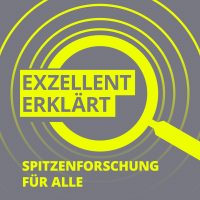 We proudly present the first podcast of the German Clusters of Excellence!
We proudly present the first podcast of the German Clusters of Excellence!
It regularly reports from one of the 57 clusters that are funded as part of the Excellence Strategy of the German federal and state governments. The journey goes right across the country and the topics are just as diverse as the locations: from African studies to Future of Medicine to Quantum Science. The researchers of the clusters of excellence talk to podcaster Larissa Vassilian about how they want to find scientifically sound answers to relevant topics of our time – for the society of tomorrow. The podcast concept was developed by a team of ten science communication experts from ten Clusters of Excellence – including e-conversion and two more Munich clusters, MCQST and SyNergy. You can find the German-language podcast on all popular platforms as Apple Podcasts, Spotify, Google Podcasts, Amazon Music,… Or visit the website: www.exzellent-erklaert.de
Folge 31: “Die Sprache des Lebens – Biologische Signale erkennen und nutzen“(Link)
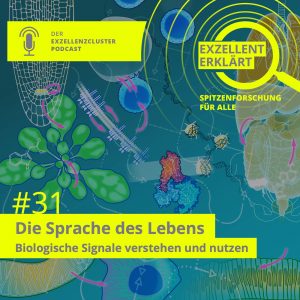
How do the cells of a living being communicate with each other? The Cluster of Excellence CIBSS investigates the biological signals that ensure that cells and tissues in multicellular organisms work together and adapt to environmental influences. Understanding this “language of life” helps to master important societal challenges such as health and food security, because many diseases are based on faulty signaling processes – and signals influence how plants react to their environment and a changing climate.
Folge 30: “Wissenschaftsfreiheit: Wenn Forschung angegriffen wird“(Link)
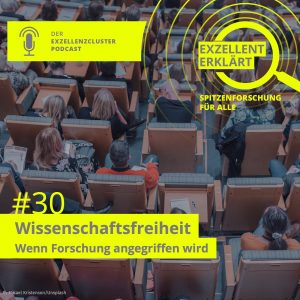
Science and democracy belong together. It is important that science can act freely. Researchers should be able to determine for themselves the topics on which they conduct research. They should be able to express themselves politically. However, scientific freedom is increasingly under attack worldwide. The three major challenges to scientific freedom are cultural change, economization and alternative ways of gaining knowledge. Who threatens academic freedom and why? Are only autocratic systems threatened? What is the state of academic freedom in Germany? The Cluster of Excellence SCRIPTS is discussing this problem.
Folge 29: “Frühchen – Wie können wir sie vor gefährlichen Infektionen schützen?“(Link)

The team of the RESIST Cluster of Excellence cares for people who can be seriously harmed by bacteria and viruses – including premature and newborn babies, for example. Because when they become infected with a germ, their immune system often reacts far too strongly – which can lead to inflammation of the blood, lungs and intestines.
About a quarter of all babies born before the 32nd week of pregnancy develop a severe infection in infancy, which can also be life-threatening. It is not known exactly why this is so. New concepts of prevention and therapy are needed – among other things because the time after birth also influences susceptibility to allergies and infections as well as chronic inflammatory bowel diseases later in life. “The children have to “slide into” their environment and find a balance. This is the main task of immune adaptation in the first year of life,” says Prof. Viemann.
Folge 28: “Kryptographie – Quantenresistent und menschlich“(Link)
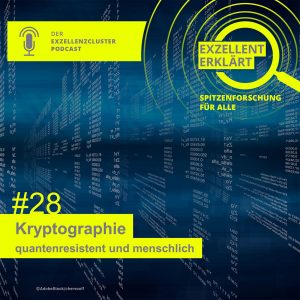
Our data is encrypted when we surf the internet or send a message via messenger. Until now, many of these methods have been quite secure – but when the quantum computer comes along, this security will be gone. That is why the Cluster of Excellence CASA has developed encryption methods that can even withstand quantum computers. Research is also being conducted into how IT security can be implemented in such a way that it is easier for users to understand and use.
Folge 27: “Chronic inflammation – Where does it come from, can we stop it?“(Link)
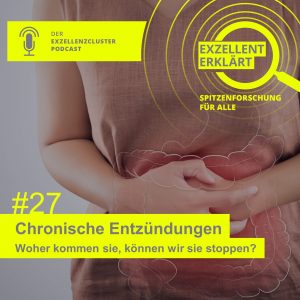
Psoriasis, rheumatism, Crohn’s disease – more and more people have to live with chronic inflammatory diseases. The Cluster of Excellence PMI (Precision Medicine for Chronic Inflammatory Diseases) is searching for the causes of these diseases and striving for individualised treatments for patients. The big goal is to stop inflammatory diseases and thus prevent their progression. In the search for the causes of chronic inflammatory diseases, cluster members also study ancient DNA (aDNA) in order to understand the development of the human immune system.
Folge 26: “PhenoRob – Autonomous systems in crop production“(Link)
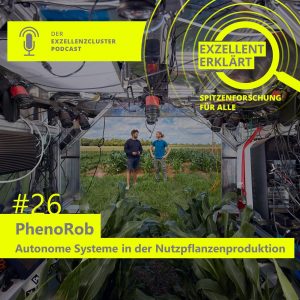
What will the future of agriculture look like? At the PhenoRob Cluster of Excellence in Bonn, they have a pretty clear idea. Drones fly over the fields and record the condition of the plants. On the ground, robots are on the move, specifically supplying individual crops with fertiliser or removing weeds.
Folge 25: “Hirnforschung – Vom Gedächtnis zur Erkrankung”(Link)
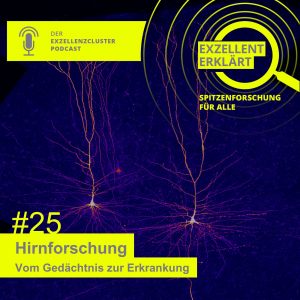
When we experience exciting things, our brain stores them. We have a short-term and a long-term memory. These are facts we all know about our brain. But science doesn’t yet know exactly how all this works. And only when it is deciphered how we can remember things will we also understand all the dementia diseases that have to do with forgetting. The NeuroCure Cluster of Excellence is not only concerned with memory, but also with diseases such as autoimmune encephalitis. In this disease, the body fights against itself – and thus disrupts important functions of the brain. The patients, who are often young, suffer from psychoses, hallucinations and dementia.
Folge 24: “Fuel Science Center: Kraftstoffe für die Zukunft“(Link)
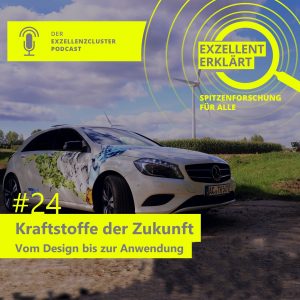
Climate change is causing a rethink in many areas. This is also important in the area of mobility. In addition to electric cars, which are charged with regeneratively generated electricity, research is also being conducted in the field of green hydrogen propulsion. But that’s not all: “The Fuel Science Center” is exploring many different avenues and looking for ways to produce fuels without fossil components that are at the same time sustainable, affordable and socially acceptable. A key technology here is catalysis.
Folge 23: “Unser Immunsystem – Von Entzündungen, Impfung und Mikroplastik”(Link)
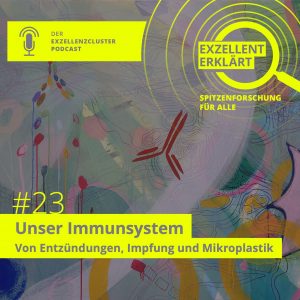
In this episode, experts from the Cluster of Excellence “ImmunoSensation2” at the University of Bonn talk about our immune system.
Prof. Dr. Gunther Hartmann explains what the innate and acquired immune system is all about and how we can use mRNA vaccines to specifically support our immune system in defending against viruses.
Prof. Elvira Mass talks about environmental and environmental influences on the immune system. For one thing, studies have shown that we all have microplastic particles in our bodies – to what extent this harms us is what the cluster is trying to explore. She also explains how factors such as obesity in the mother are transferred to the unborn child and eventually accompany it throughout its life.
Folge 22: “Der Ozeanboden: Unerforschte Schnittstelle der Erde”(Link)
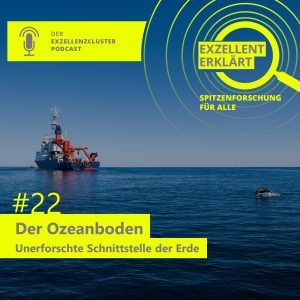
There are still many unanswered questions concerning the oceans and the ocean floor. Especially when we consider the effects of climate change on the oceans. Prof. Michal Kucera uses sediment samples to research fossil plankton and thus draws conclusions about its migration movements as well as the biodiversity of the past 100,000 years – also with the help of so-called “ancient DNA” (aDNA). Dr Miriam Römer sails the high seas once or twice a year to investigate so-called “cold springs” and to find out how much methane is bound to the seabed and will possibly escape as soon as the climate warms further. With their research, both are helping to explore the ocean floor as an interface – in the cluster “Ocean floor – unexplored interface of the Earth“, which is based at the University of Bremen.
Folge 21: “Dunkle Materie: Auf der Suche nach den fehlenden Teilchen”(Link)
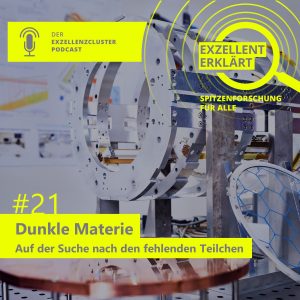
No one has yet provided direct proof that dark matter exists. But most physicists no longer doubt that something exists in the universe that accounts for a far greater proportion of its total mass than the visible substance. In the Cluster of Excellence “Quantum Universe“, various approaches are being pursued to track down this mysterious matter.
Folge 20: “Grüne Chemie – Katalyseprozesse können nachhaltig sein“(Link)
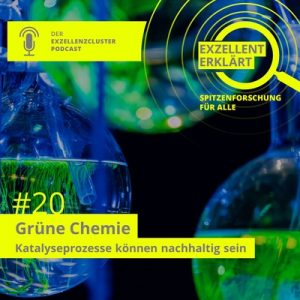
Prof. Matthias Driess member of the Cluster of Excellence “UniSysCat” is a chemist with a passion. He talks enthusiastically about green chemistry, about the idea that one day we will produce our own methane at home to fuel our cars. Green chemistry is about the cycle of things, about as little “waste” as possible in chemical processes and about taking nature as a model.
Folge 19: “Das „ORIGINS of Life Lab“: Der Entstehung des Lebens auf der Spur“(Link)
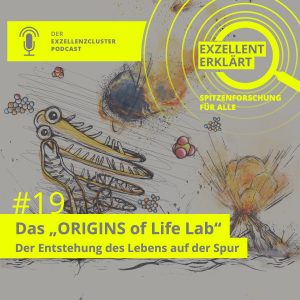
How did life come into being? Very little is known about the beginnings of life. The Cluster of Excellence ORIGINS in Munich is trying to create life in the laboratory. The researchers do not want to trace the biological evolution reflected in the family tree of animals, plants and microorganisms. They are thinking rather of very rudimentary forms of life: of the first molecules that were able to reproduce themselves and pass on information independently. Such units must have developed in an evolution of molecules from far simpler building blocks.
Folge 18: “Woraus ist unsere Zukunft gemacht? Aktive Materialien und bio-inspiriertes Design“(Link)
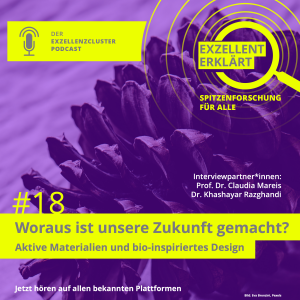
The “Matters of Activity” cluster is about the question of active materiality. The interdisciplinary approach they have created themselves gives the researchers the opportunity to look at the central questions from different angles: How do we deal with materiality in the age of digitalisation? Can other understandings of materiality lead to other modes of production or other ways of living? Other topics include sustainability and bio-inspired design, for example textiles that use mechanisms from nature to become active materials themselves.
Folge 17: “Krebsforschung – Mit veränderten T-Zellen dem Krebs an den Kragen”(Link)
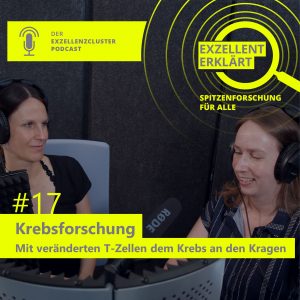
Cancer is the second most common cause of death in Germany. Among 45- to 65-year-olds, cancer is even the most common cause of death. The Cluster of Excellence “iFIT” is therefore researching new and innovative treatment options to get a grip on this insidious disease. An important part of this is our immune system. How do we get our own immune system to get to grips with cancer? T-cells play a crucial role. They recognise foreign proteins when they are presented on an endogenous cell. However, they cannot always perceive the tumour cells as a threat. In order for T cells to be able to recognise and kill tumour cells, junior research group leader Dr. Judith Feucht and her team are investigating a new possibility: with the help of a genetic engineering procedure, the body’s own T cells can be converted in the laboratory into chimeric antigen receptor T cells, or CAR T cells for short, and then transferred back into the human organism. Equipped with these antigen receptors, the T cells are then able to detect and fight the tumour cells in the body.
But how can we check whether the therapy is actually effective? This is where Prof. Dr. Bettina Weigelin and her research group come in. Equipped with state-of-the-art intravital microscopes, they bring to light what would not be visible to the human eye alone: How the modified T cells fight the tumour cells. Working together, the two scientists can precisely observe whether the modified T cells are doing their job and decide whether they need to be improved in the laboratory.
Folge 16: “Archäologie – Von gestern für heute lernen”(Link)
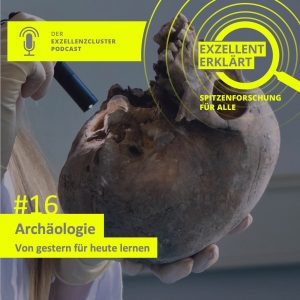
Prof. Johannes Müller and Dr. Katharina Fuchs from the Cluster of Excellence „ROOTS – Social, Environmental and Cultural Connectivity in Past Societies“ conduct research on various issues that affect our roots. It is about climate change, sustainability, inequality & identity, mobility & migration and conflicts. It is astonishing that upon closer examination, our current issues are not as new as they seem to us. Humans have been changing their environment for thousands of years, for example through hunting. And migration has also always existed, as Prof. Johannes Müller points out.
Folge 15: “Computersimulationen – Per Modell zum Erkenntnisgewinn in der Optik”(Link)
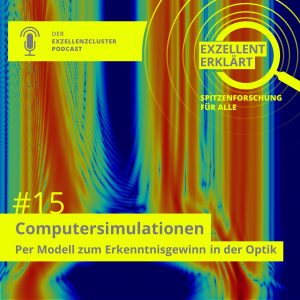
In this episode, physicists from the Cluster of Excellence PhoenixD have their say: spokesperson Prof. Dr. Uwe Morgner, Dr. Oliver Melchert and doctoral student Stephanie Willms. The three are specialists in the simulation of optical, i.e. light-based phenomena. They use computers to calculate physical laws so precisely that their predictions complement practical experiments and in some cases make them superfluous. This so-called third pillar of science – in addition to experiment and theory – is becoming increasingly important as computing capacities continue to grow.
Folge 14: “Zukunft des Hörens – mit Forschung und Technik gegen die Schwerhörigkeit“(Link)
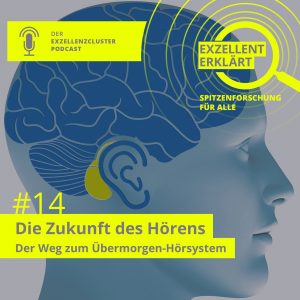
Hearing loss is a widespread disease. 15 million people in Germany are affected, and from the age of 70, every second person in Germany has hearing problems. The Cluster of Excellence Hearing4All wants to find a remedy. On the one hand, it is about basic research on individual hearing, on the other hand, it is about better hearing aids and thirdly, it is about solutions so that hearing loss can be diagnosed at an early stage. Connections between hearing loss and dementia are also being investigated, as well as the possibility of operating on cochlear implants in the most minimally invasive way possible.
Folge 13: “SMARTe Pflanzen für die Sicherung unserer Ernährung”(Link)
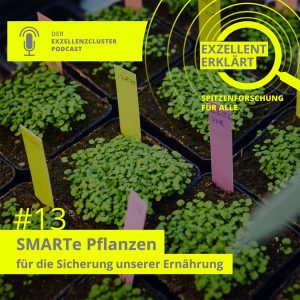
The consequences of climate change are endangering our harvests and thus the nutrition of the world’s population. How can we breed crops that are high-yielding and healthy, but at the same time withstand increasing heat, drought and disease? Professor Maria von Korff Schmising and Dr Markus Stetter are researching this at CEPLAS, Germany’s only cluster of excellence in the field of plant research, in Düsseldorf, Jülich and Cologne. As guests on the podcast “Exzellent erklärt – Spitzenforschung für alle” (Excellent Explained – Top Research for Everyone), they report on the advantages that perennial crops have over annual crops and what past domestication of plants teaches us about how we obtain new crops with special nutrients and good adaptation to climate change.
Folge 12: “3D-Druck – Neue Materialien, neue Möglichkeiten ” (Link)
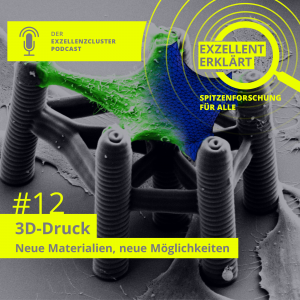
Prof. Jochen Wittbrodt and Prof. Peter Gumbsch work in the same Cluster of Excellence “3D Matter to Order“, but in very different research areas. What they have in common is that they are both researching applications in which more precise, faster and more powerful 3D printing opens up new avenues.
Jochen Wittbrodt and his doctoral student Christina Schlagheck are researching organoids, artificially produced organ-like cell structures. For example, a retina could one day come out of the 3D printer. Peter Gumbsch is developing metamaterials that have specifically designed properties and could also contribute to sustainability.
Folge 11: “Energieforschung – Starke Akkus für die Energiewende” (Link)
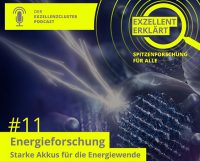 In 2030, more than ten million electric cars will populate the roads in Germany. And all of them will need a powerful, fast-charging and safe battery. How is that going to happen? In this episode, Prof. Dr. Bettina Lotsch and Sina Stegmaier provide insight into battery research. What are the problems of current rechargeable batteries? And how could they be solved? The two chemists from the Cluster of Excellence e-conversion also explain how batteries actually work and what materials are needed for a high-performance battery. And they reveal what solid-state batteries are all about, in which the automotive industry in particular has such high hopes.
In 2030, more than ten million electric cars will populate the roads in Germany. And all of them will need a powerful, fast-charging and safe battery. How is that going to happen? In this episode, Prof. Dr. Bettina Lotsch and Sina Stegmaier provide insight into battery research. What are the problems of current rechargeable batteries? And how could they be solved? The two chemists from the Cluster of Excellence e-conversion also explain how batteries actually work and what materials are needed for a high-performance battery. And they reveal what solid-state batteries are all about, in which the automotive industry in particular has such high hopes.
Folge 10: “Mikrobiome – Mikroorganismen im (Un-)Gleichgewicht” (Link)
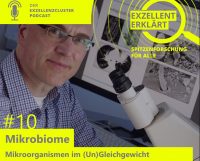 Exploring the microverse is all about the communication and interaction of tiny creatures with each other and with their environment. This is because they have often been living together for millions of years and are rarely found in isolation. Prof. Axel Brakhage from the Cluster of Excellence Microverse (Balance of the Microverse) can imagine that the next antibiotic agent may be waiting to be discovered in our front garden. And from this, in the best case, a drug can be developed that specifically attacks undesirable microorganisms and does not affect the beneficial ones.
Exploring the microverse is all about the communication and interaction of tiny creatures with each other and with their environment. This is because they have often been living together for millions of years and are rarely found in isolation. Prof. Axel Brakhage from the Cluster of Excellence Microverse (Balance of the Microverse) can imagine that the next antibiotic agent may be waiting to be discovered in our front garden. And from this, in the best case, a drug can be developed that specifically attacks undesirable microorganisms and does not affect the beneficial ones.
Folge 9: “Quantencomputer – Wie nah sind wir der Anwendung?” (Link)
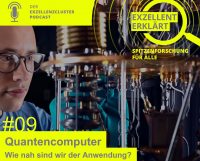 Michael Köhl and Sebastian Diehl research the fundamentals of quantum mechanical phenomena. At the Cluster of Excellence ML4Q (Matter and Light for Quantum Computing), they bring together their expertise in experimental and theoretical physics to create network architectures for quantum computers. There are many problems to be solved – including the question of how quantum computers can be networked, even though the quantum states they need to function are difficult to keep stable.
Michael Köhl and Sebastian Diehl research the fundamentals of quantum mechanical phenomena. At the Cluster of Excellence ML4Q (Matter and Light for Quantum Computing), they bring together their expertise in experimental and theoretical physics to create network architectures for quantum computers. There are many problems to be solved – including the question of how quantum computers can be networked, even though the quantum states they need to function are difficult to keep stable.
Folge 8: “Nachhaltiges Fliegen – Neue Flugzeugmodelle, andere Treibstoffe” (Link)
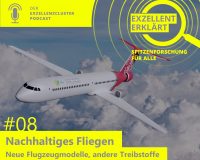 Prof. Jens Friedrichs and Prof. Rolf Radespiel from the Cluster of Excellence SE²A (Sustainable and Energy-Efficient Aviation) in Braunschweig have an ambitious goal: by 2050, aircraft should be flying sustainably. This means that they will then no longer be in the air with fossil kerosene, but with either electric power, hydrogen or synthetic kerosene. These new-generation aircraft will no longer have much in common with the ones we know.
Prof. Jens Friedrichs and Prof. Rolf Radespiel from the Cluster of Excellence SE²A (Sustainable and Energy-Efficient Aviation) in Braunschweig have an ambitious goal: by 2050, aircraft should be flying sustainably. This means that they will then no longer be in the air with fossil kerosene, but with either electric power, hydrogen or synthetic kerosene. These new-generation aircraft will no longer have much in common with the ones we know.
Folge 7: “Altern – Wie können wir gesund alt werden?” (Link)
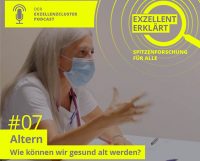 Prof. Maria Cristina Polidori and Prof. Björn Schumacher both conduct research on the topic of aging at the Cluster of Excellence CECAD (Cellular Stress Responses in Aging-Associated Diseases). Prof. Polidori is a doctor at the university hospital with the aim of becoming active in old age before illnesses occur. Prof. Schumacher works in the laboratory where an aging clock, a genetic test, is intended to provide information on how our biological age changes – for example through factors such as unhealthy diet or smoking. With this precise measurement method, it may soon be possible to document the success or failure of therapies at an early stage and then to readjust them.
Prof. Maria Cristina Polidori and Prof. Björn Schumacher both conduct research on the topic of aging at the Cluster of Excellence CECAD (Cellular Stress Responses in Aging-Associated Diseases). Prof. Polidori is a doctor at the university hospital with the aim of becoming active in old age before illnesses occur. Prof. Schumacher works in the laboratory where an aging clock, a genetic test, is intended to provide information on how our biological age changes – for example through factors such as unhealthy diet or smoking. With this precise measurement method, it may soon be possible to document the success or failure of therapies at an early stage and then to readjust them.
Folge 6: “Klimawandel – Sind 1,5 Grad noch plausibel?” (Link)
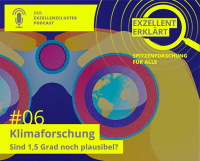 Prof. Anita Engels and Dr. Christopher Heidemann conduct research at the Cluster of Excellence CLICCS (Climate, Climatic Change, and Society) in Hamburg. The Hamburg Climate Futures Outlook is a report that identifies ten key factors that are significantly involved in climate change from a sociological perspective. These include, for example, people’s consumption behavior, but also the so-called divestment movement on the financial market. Are these factors pointing in the right direction? Is it plausible, then, that we will meet our climate targets? The Outlook comes to a sobering conclusion.
Prof. Anita Engels and Dr. Christopher Heidemann conduct research at the Cluster of Excellence CLICCS (Climate, Climatic Change, and Society) in Hamburg. The Hamburg Climate Futures Outlook is a report that identifies ten key factors that are significantly involved in climate change from a sociological perspective. These include, for example, people’s consumption behavior, but also the so-called divestment movement on the financial market. Are these factors pointing in the right direction? Is it plausible, then, that we will meet our climate targets? The Outlook comes to a sobering conclusion.
Folge 5: “Quantenwissenschaft – Grundlage der Technologien von morgen (Link)
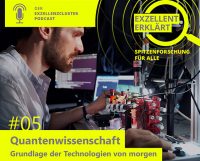 Prof. Harald Weinfurter and Prof. Kai Müller are conducting research at the Cluster of Excellence MCQST (Munich Center for Quantum Science and Technology) in the field of quantum communication. On the one hand, this involves transmitting quantum information over long distances. And on the other hand, it involves distributing a key for data encryption to distant partners in an absolutely tap-proof manner. But before the podcaster Larissa Vassilian talks about the current research with two scientists, some basics of quantum physics have to be explained, for example the principle of superposition or entanglement.
Prof. Harald Weinfurter and Prof. Kai Müller are conducting research at the Cluster of Excellence MCQST (Munich Center for Quantum Science and Technology) in the field of quantum communication. On the one hand, this involves transmitting quantum information over long distances. And on the other hand, it involves distributing a key for data encryption to distant partners in an absolutely tap-proof manner. But before the podcaster Larissa Vassilian talks about the current research with two scientists, some basics of quantum physics have to be explained, for example the principle of superposition or entanglement.
Folge 4: “Bildungschancen – Welche Rolle das Elternhaus spielt” (Link)
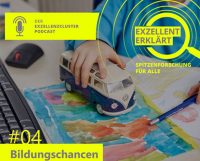 What is the pandemic doing to our children and teenagers? What can we do to help children, no matter what family background they come from? And how fair is our education system? These kind of questions adresses the economics cluster ECONtribute (ECONtribute – Markets & Public Policy) from Bonn and Cologne. You want to know the answers? Then listen to the 4th episode of “Exzellent erklärt” – the podcast of the German Clusters of Excellence.
What is the pandemic doing to our children and teenagers? What can we do to help children, no matter what family background they come from? And how fair is our education system? These kind of questions adresses the economics cluster ECONtribute (ECONtribute – Markets & Public Policy) from Bonn and Cologne. You want to know the answers? Then listen to the 4th episode of “Exzellent erklärt” – the podcast of the German Clusters of Excellence.
Folge 3: “Bakterien im Darm – Wie Medikamente unser Mikrobiom beeinflussen” (Link)
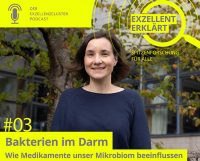 Did you know that the bacterial composition in your intestine is as unique as your fingerprint? Or that these little microorganisms strongly influence how your respond to pharmaceuticals? Learn more about these fascinating topics in the current episode of “Exzellent erklärt”. This time with the Tübingen Cluster of Excellence CMFI (Controlling microbes to fight infections). Dr. Lisa Maier is specializes in the gut microbiome. In her group, she researches antibiotics and other drugs to find out to what extent they affect the health of our gut microbiome. Some of them have positive effects (sometimes unintentionally), while others harm the community of microorganisms in our gut. Finding out exactly which drugs cause which effects is the goal of Lisa Maier’s research.
Did you know that the bacterial composition in your intestine is as unique as your fingerprint? Or that these little microorganisms strongly influence how your respond to pharmaceuticals? Learn more about these fascinating topics in the current episode of “Exzellent erklärt”. This time with the Tübingen Cluster of Excellence CMFI (Controlling microbes to fight infections). Dr. Lisa Maier is specializes in the gut microbiome. In her group, she researches antibiotics and other drugs to find out to what extent they affect the health of our gut microbiome. Some of them have positive effects (sometimes unintentionally), while others harm the community of microorganisms in our gut. Finding out exactly which drugs cause which effects is the goal of Lisa Maier’s research.
Folge 2: “Alzheimer: Entstehung, Erkenntnisse, Forschungsfragen” (Link)
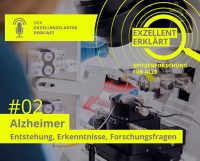 Prof. Christian Haass has been conducting research on Alzheimer’s disease for 30 years. The disease is affecting more and more people in our aging society. It is not curable – but is there a prospect of drugs against it or even a vaccination? The Cluster of Excellence in Munich SyNergy (Munich Cluster for Systems Neurology) brings together a wide variety of institutions to get to the bottom of Alzheimer’s and other brain diseases: there are SyNergy working groups at the TUM, the LMU, the DZNE, at two Max Planck Institutes, at both university hospitals and also at the Helmholtz Center. Larissa Vassilian talks to Prof. Haass about the research results so far, about the biggest problems in Alzheimer’s research and about the questions that remain open.
Prof. Christian Haass has been conducting research on Alzheimer’s disease for 30 years. The disease is affecting more and more people in our aging society. It is not curable – but is there a prospect of drugs against it or even a vaccination? The Cluster of Excellence in Munich SyNergy (Munich Cluster for Systems Neurology) brings together a wide variety of institutions to get to the bottom of Alzheimer’s and other brain diseases: there are SyNergy working groups at the TUM, the LMU, the DZNE, at two Max Planck Institutes, at both university hospitals and also at the Helmholtz Center. Larissa Vassilian talks to Prof. Haass about the research results so far, about the biggest problems in Alzheimer’s research and about the questions that remain open.
Folge 1: “Taktiles Internet – Intelligente Textilien, Roboter und Hilfe im OP” (Link)
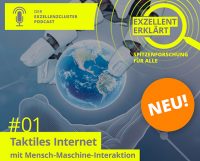 In the first episode, everything revolves around the cooperation of humans and machines, in short: the tactile internet. Scientists from the Cluster of Excellence CeTI (Center for Tactile Internet with Human-in-the-Loop) in Dresden talk about their research and visions: “When I’m at home in my old age and have trouble getting out of my chair, couldn’t my trousers help me stand up?” asks Prof. Frank H. P. Fitzek, for example. At CeTI, experts from different fields explore the various possibilities of the tactile internet: Intelligent clothing is intended to help people stay independent in old age, or to support them in learning new skills such as playing the piano. In the near future, it should be possible to send not only images and sound but also touches via the internet.
In the first episode, everything revolves around the cooperation of humans and machines, in short: the tactile internet. Scientists from the Cluster of Excellence CeTI (Center for Tactile Internet with Human-in-the-Loop) in Dresden talk about their research and visions: “When I’m at home in my old age and have trouble getting out of my chair, couldn’t my trousers help me stand up?” asks Prof. Frank H. P. Fitzek, for example. At CeTI, experts from different fields explore the various possibilities of the tactile internet: Intelligent clothing is intended to help people stay independent in old age, or to support them in learning new skills such as playing the piano. In the near future, it should be possible to send not only images and sound but also touches via the internet.
